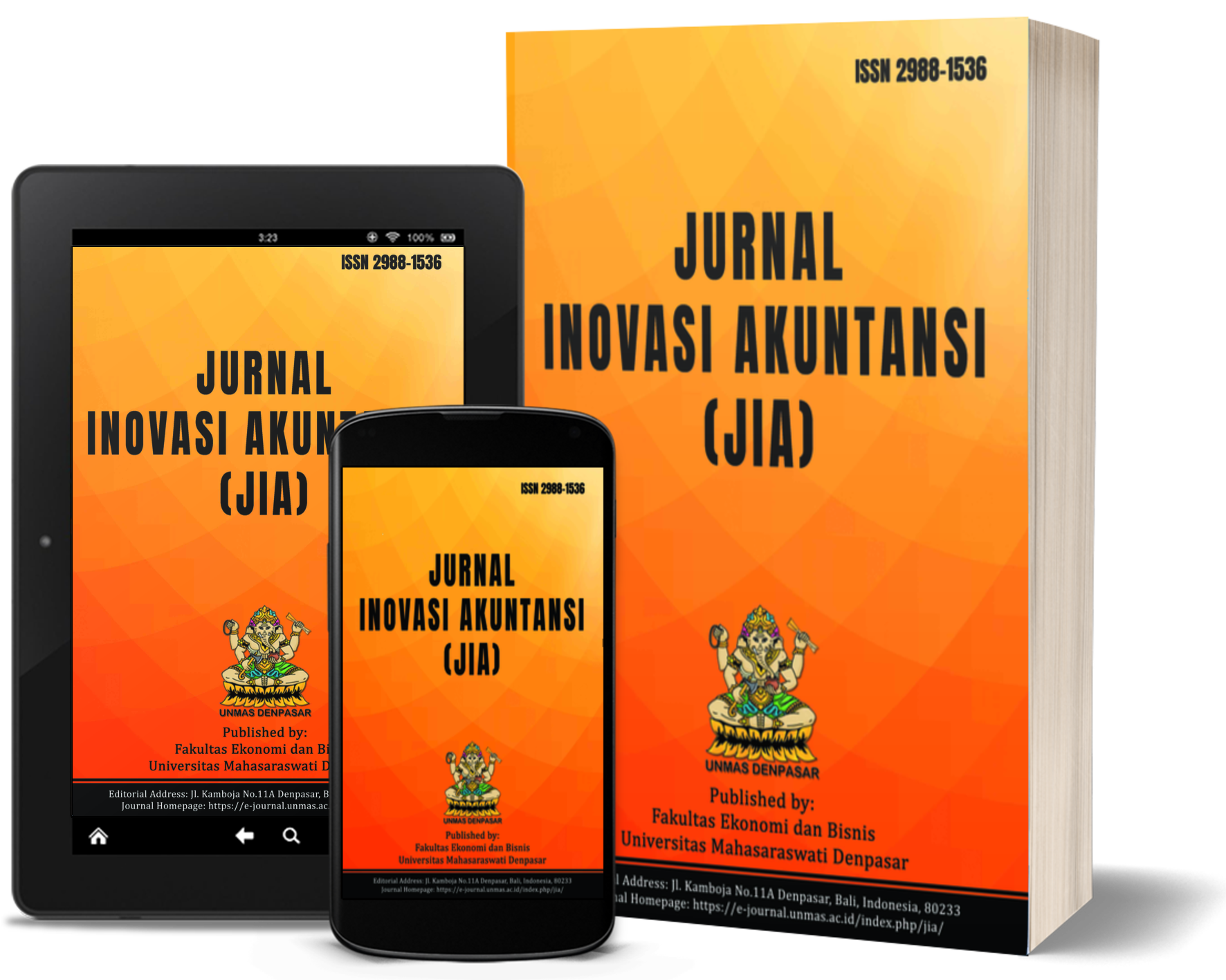Faktor Presepsi dan Keamanan terhadap Implementasi Sistem Informasi Akuntansi Berbasis Seluler Pada UMKM di Kota Kendal
DOI:
https://doi.org/10.36733/jia.v3i1.11195Keywords:
Accounting Information System, UMKMAbstract
This study aims to empirically analyze the factors influencing the mobile-based Small and Medium Enterprises (UMKM) Accounting Information System (AIS) in Kendal City. This research employs a quantitative approach with a sample size of UMKM in Kendal City and utilizes primary data. The data is analyzed using SPSS software version 22. The results of this study indicate that the perceptions of ease of use and perceived needs do not have a significant influence on the implementation of mobile-based UMKM Accounting Information Systems (AIS), meanwhile, security and performance expectation have a significant influence on the implementation of mobile-based UMKM AIS.
References
Ajie, M. D. (1996). Sistem Informasi Manajemen : konsep dasar. 1–9.
Ajzen, I., & Fishbein, M. (1980). Understanding Attitudes and Predicting Social Behavior. New Jersey: Prentice Hal.
Amanda Tienisya Raharjo dan Arfhan Prasetyo. (2017). Analisis Pengaruh Kemudahan Penggunaan Sopp Terhadap Kepuasan Kerja Pegawai Dengan Pendekatan TAM. Sistem Informasi STMIK Antar Bangsa, 2, 129–138.
Anggraeni, M. (2020). Pengaruh Technology Acceptance (TAM) dan Kualitas Layanan terhadap Minat Nasabah dalam Menggunakan M-Banking.
Davis, F. (1989). Perceived usefulness, perceived ease of use, and user acceptance of information technology. MIS Quarterly, 319–339.
Dinas Perdagangan, K. dan U. (2023). Data Statistik UMKM. https://satudata.dinkop- umkm.jatengprov.go.id/data/umkm-kabkota/Kabupaten Kendal
Dinas Perindustrian dan Perdagangan. (2023). Profil Usaha Mikro Kecil Menengah (UMKM) Bidang Industri per Kelurahan di Kota Magelang. DataGo.
Dwi irawan dan Muhammad Wildan Affan. (2020). Pengaruh Privasi dan Keamanan Terhadap Niat Menggunakan Payment Fintech. Jurnal Kajian Akuntansi, 4, 11. https://ijler.umsida.ac.id/index.php/ijler/article/view/782/871?download=pdf
Ghozali I. (2016). Aplikasi Analisis Multivariate Dengan Program SPSS. Universitas Diponegoro., 8.
Ihda Arifin Faiz, Nabella Duta Nusa, F. Z. (2021). SISTEM INFORMASI AKUNTANSI. Gadjah Mada University Press. https://books.google.co.id/books?hl=id&lr=&id=tTMXEAAAQBAJ&oi=fnd&pg=PA1&d q=info:Xr4sT7rBpokJ:scholar.google.com/&ots=_zgrbx4ruh&sig=Mt_VK7GpYq6IS0jRB G3RXkAFaV4&redir_esc=y#v=onepage&q&f=false
Irmadhani dan Nugroho. (2012). Pengaruh Presepsi Kebermanfaatan, Presepsi Kemudahan, Pengaruh Presepsi Kebermanfaatan, Keamanan, Kepercayaan Dan Presepsi Kemudahan Pengguna Pengguna Terhadap Penggunaan Online Banking Pada Mahasiswa S1 Fakultas Ekonomi Universitas Negeri Yogyakarta. 1–20.
Jogiyanto, H. (2007). Sistem Informasi Keperilakuan. https://ejournal3.undip.ac.id/index.php/accounting/article/view/29074
Jumaili dan Salman. (2005). Kepercayaan terhadap Teknologi Sistem Informasi Baru dalam Evaluasi Kinerja Individual. Kumpulan Materi Simposium Nasional Akuntansi VIII.
Kenneth dan Jane. (2007). Sistem Informasi Manajemen. Jakarta, Salemba Empat.
Leroi-Werelds S, Streukens S, Brady MK, S. G. (2014). Assessing The Value Of Commonly Used Methods For Measuring Customer Value: A Multi-Setting Empirical Study. Journal of the Academy of Marketing Science, 430–451.
Limanseto, H. (2021). UMKM Menjadi Pilar Penting dalam Perekonomian Indonesia.
Ekon.Go.Id, 1. ekon.go.id/publikasi
Miftahurrohman, & Dewi, S. R. (2021). Mobile Accounting Information. 13(2), 168–177. Nafisa, Ji., & Sukresna, I. (2018). Analisis Pengaruh Kualitas Layanan, Harapan Kinerja dan
Citra Perusahaan terhadap Loyalitas Pelanggan melalui Kepuasan Pelanggan sebagai Variabel Intervening (Studi pada Rumah Sakit Islam Sultan Agung Semarang). Diponegoro Journal of Management, 7(3), 1–27.
Nur Jannah Abdi Aziz, Nisa Noor Wahid, dan E. R. (2023). Persepsi Kepuasan Dan Minat Penggunaan Sistem Informasi Aplikasi Pencatatan Informasi Keuangan (SIAPIK) Nur. JEBA, 25, 1–16.
Nurul, S., Anggrainy, S., & Aprelyani, S. (2022). Faktor-Faktor Yang Mempengaruhi Keamanan Sistem Informasi : Keamanan Informasi , Teknologi Informasi Dan Network ( Literature Review Sim ). Jurnal Ekonomi Manajemen Sistem Informasi (Jemsi), 3(5), 564–573.
Riani, N. (2017). Model Perilaku Pencarian Informasi Guna Memenuhi Kebutuhan Informasi ( STUDI LITERATUR ). 1(2).
Samiaji Sarosa. (2009). Buku Sistem Informasi Akuntansi. Grasindo Jakarta, 48. https://dupakdosen.usu.ac.id/bitstream/handle/123456789/69221/fulltext.pdf?sequence=1& isAllowed=y
Saragih, A. W. P., & Juliarsa, G. (2021). Analisa Kualitas, Keamanan, Kemudahan, dan Kecepatan dari Sistem Informasi Akuntansi di Perusahaan Global Tiket Network. E-Jurnal Akuntansi, 31(7), 1771. https://doi.org/10.24843/eja.2021.v31.i07.p13
Sinarwati, N. K., Sujana, E., Nyoman, D., & Herawati, T. (2019). Peran Sistem Informasi Akuntansi Berbasis Mobile Bagi Peningkatan Kinerja Umkm. License Jurnal KRISNA: Kumpulan Riset Akuntansi, 11(1), 26–32. http://dx.doi.org/10.22225/kr.11.1.1123.26-32
Subowo, S.Kom., M.T.I., M. H. (2020). Pengaruh Prinsip Technology Acceptance Model (TAM) Terhadap Kepuasan Pelanggan Aplikasi Ojek Online Xyz. Walisongo Journal of Information Technology, 2(2), 79. https://doi.org/10.21580/wjit.2020.2.2.6939
Usman. (2013). Implementasi Sistem Informasi Akuntansi Pada Pt.Wahyu Tripraja Karya Pekanbaru - Riau. Jurnal SISTEMASI, 2, 1–13.
Venkatesh, V. dan F. D. D. (2000). A Theoretical Extension of the Technology Acceptance Model: Four Longitudinal Fiedl Studies. Management Science, 2, 186–204.
Victor H, V. (1964). Work and Motivation. P. Book. Jossey-Bass.
Wowor, N. E., Sentinuwo, S. R., & Karouw, S. D. S. (2018). Analisa Keamanan Informasi Pemerintah Kota Manado Menggunakan Indeks Kami. Jurnal Teknik Informatika, 13(3), 1–10.
Zain F dan Andharwati E, A. (2022). Faktor Yang Mempengaruhi Implementasi Sistem Informasi Akuntansi UMKM Berbasis Seluler Pada UMKM Surabaya Pusat. 18(02), 189–202. http://www.fe.ummetro.ac.id/ejournal/index.php/JA
Downloads
Published
How to Cite
Issue
Section
License
Copyright (c) 2025 Sulistyo Sri Rahayu, Taufiq Andre Setiyono

This work is licensed under a Creative Commons Attribution 4.0 International License.








